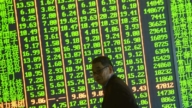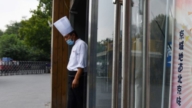【新唐人2013年07月06日訊】由於中共當局不願通過改變貨幣和財政政策,來應對經濟放緩,投資者開始撤離中國市場。學者指出,在GDP快速增長、和高樓大廈這種表面的繁榮下面,實際上,中國經濟卻非常脆弱,而且由國民承擔的巨大代價和痛苦,遠遠超出這種增長給他們帶來的實際收益。
據7月4號美國《華爾街日報》的報導,市場調研資料提供商EPFR的資料顯示,過去18週中,有16週出現了全球基金經理將資金撤出中國股市的現象,截至6月5號的五個交易日,就纍計撤出8.34億美元,創2008年1月份金融危機爆發以來的最大流出規模。
大陸的「申銀萬國證券」,7月1號也發佈全球資金流向的報告。報告指出,上週,中國股市流出資金量達到11.6億美元,環比增加27%,同時2.9億美元流出債市,環比增加223%。
法國「巴黎投資(BNP Paribas Investment Partners)」駐香港的亞太區股票投資主管鄺樂天也表示,他們已減持中國股票,而他管理的資產規模為20億美元。
與此同時,中國國內的投資者也在撤離股市。大股東、公司高管和持有股權超過5%的個人,紛紛拋售手中的股票。據「瑞銀(UBS)」的研究顯示,按百分比計算,這些人5月份在創業板的拋售力度,創下自全球金融危機以來的最高水準。
「北京大學」經濟學教授夏業良指出,這種情況一方面反映投資者的心態——不看好中國經濟﹔另一方面也反映出,投資者對政府操控或利益集團操控的市場不信任。
北京大學經濟學教授夏業良:「中國股市長久以來就有這樣一個評論,說它不是一個正常的投資市場、資本市場,而是一個賭場,而且一直是政策式,受政策的影響極大,經常會被有關集團、利益集團所操縱。」
目前,正在美國「斯坦福大學胡佛研究院」做訪問學者的夏業良表示,撤出股市是非常明智的做法。因為,在國外,無論是對中國的經濟、金融體系和社會、政治各層面,都有擔憂。他說,中國在表面上,GDP快速增長、高樓大廈林立,實際上,中國經濟增長很多是不健康的,是非常脆弱的。
中國金融智庫研究員鞏勝利:「中國股市現在已經脫離了全球的資本市場,因為它實行的人治管理方式,還有它的資本限制、股市上市的成分,還有企業的黑洞,在全球各國,特別是G20國家裏面都是非常嚴峻的。所以它的資本市場基本上是全球的最低點。」
中國《國情內參》期刊首席研究員鞏勝利還認為,中國實行的是嚴厲的資本管理方式,如果風險資本、股市資本都走了,將會對中國股市造成無法抵抗的災難,還會對國家產業、和經濟的提升,產生負面影響。
今年以來,上海證券綜合指數纍計跌幅達到12.1%,為亞洲範圍的跌幅之最,同時是全球表現最差的股市之一。香港恆生中國企業指數的表現更為糟糕,今年至今纍計跌幅達22.2%。
同時,這種現象已經蔓延到貨幣市場,雖然中共極力想維持人民幣穩定,但投資者始終在拋售人民幣。自上月以來,人民幣匯率已下跌0.15%。香港離岸市場交易的1年期美元/人民幣無本金交割遠期報價暗示,未來12個月人民幣匯率將下跌2.8%。
夏業良:「從過去的這些年,尤其是最近的七、八年時間來看,中國的倒退是全面性的倒退,從政治、經濟、社會,倫理各個方面都在倒退。所以,大家越來越不看好。民間的抱怨聲可以說是怨聲載道。」
夏業良指出,真正了解中國的經濟學家,不會讚賞所謂的「中國經濟奇蹟」或「中國模式」,因為在中國,由國民承擔的巨大代價和痛苦,遠遠超出這種增長給他們帶來的實際收益。
採訪/常春 編輯/宋風 後製/鍾元
Investors Withdraw from Chinese Market
With Chinese authorities unwillingness to change monetary
and fiscal policies, to deal with the economic slowdown,
investors have begun withdrawing from the Chinese market.
Scholars have pointed out that
China’s economy is very fragile.
It is under a superficial prosperity of rapid
growth in GDP, and high-rise buildings.
The cost and sufferings of the Chinese people are
far beyond the real earnings brought by growth.
On July 4, according to the Wall Street Journal, market
research data provider EPFR had data showing that in
the past 18 weeks, there were 16 weeks where global
fund managers withdrew funds from China’s stock market.
As of June 5, the total withdrawal was $ 834 Million.
This was the highest outflow since the
large financial crisis in January 2008.
On July 1, SWS also released a report of global capital flows.
The report pointed out that last week, the Chinese stock
market outflow volume reached 1.16 Billion U.S. dollars.
This was an increase of 27%. Meanwhile, $ 290 million
left the bond market, which is an increase of 223%.
Kwong Letian, Asia Pacific Equity Investment Officer of
BNP (Paribas Investment Partners) in Hong Kong also
said they would reduce holdings of Chinese stocks,
and assets under his management are of $ 2 Billion.
At the same time, China’s domestic stock
market investors are also evacuating.
Largest shareholders, corporate executives and individuals
with over 5% shareholding, have started to sell their shares.
According to UBS research, in percentage terms,
the selling strength of these people in GEM
was the highest since the global financial crisis.
Economics professor Xia Ye-liang in Peking University
pointed out that, this reflects the mentality of investors.
They are not optimistic about the Chinese economy.
It also reflects investors’ mistrust of interest groups
or government control or manipulation of the market.
Xia Ye-liang: “China’s stock market has had a long
reputation that it is not a normal investment market.
It is not a capital market, but a casino,
and it has always been policy driven.
It was greatly influenced by policy, and will often be
manipulated by relevant group or interest groups.”
Xia Ye-liang is a visiting scholar of the
Hoover Institution at Stanford University.
He said that it is a very sensible approach
to withdraw from the Chinese stock market.
In other countries, there are many concerns over China’s
economic, social, political and financial systems at all levels.
He said that on the surface, GDP growth is high,
and high-rise buildings are all over in China.
However, China’s economic growth
is unhealthy, and very fragile.
Gong Shengli, a Chinese financial think-tank researcher:
“China’s stock market is out of the global capital market,
because it maintains the rule of human management.
It’s capital restrictions, and the content of stock market
listing, as well as corporate black holes, is very tough in
countries around the world, particularly in G20 countries.
So it’s capital markets are basically the lowest in the world.”
Gong Shengli is Chief researcher of Internal Reference.
Gong believes that China practices the
strictest approach to capital management.
If venture and stock market capital are gone, it will
cause irresistible disaster to the stock market in China.
It will also have a negative impact on the
national industry and economic improvement.
Shanghai Stock Exchange Composite Index
has a cumulative decline of 12.1% this year.
This is the largest in Asia, and it is also
one of the world’s worst stock markets.
Hong Kong’s Hang Seng Enterprises
Index is the worst in China.
So far, it has a cumulative decline of 22.2%.
At the same time, this phenomenon
has spread to the money market.
Although the Chinese Communist Party (CCP) tried hard to
keep RMB stable, investors have always been selling RMB.
The RMB exchange rate has
fallen by 0.15% since last month.
Hong Kong offshore market transactions per year for USD /
RMB non-deliverable forwards quote suggests that the
RMB exchange rate will fall by 2.8% in the next 12 months.
Xia Ye-liang: “From the past few years,
especially the last seven years,
China’s retrogression is comprehensive in political,
economic, social and ethical aspects.
So people are becoming less optimistic, with
grumbling discontentment among the people.”
Xia Ye-liang pointed out that economists with a real
understanding of the Chinese economy will not appreciate
the so-called Chinese economic miracle or Chinese model.
This is because people in China bear the enormous cost
and suffering, far beyond actual gains brought by growth.



























